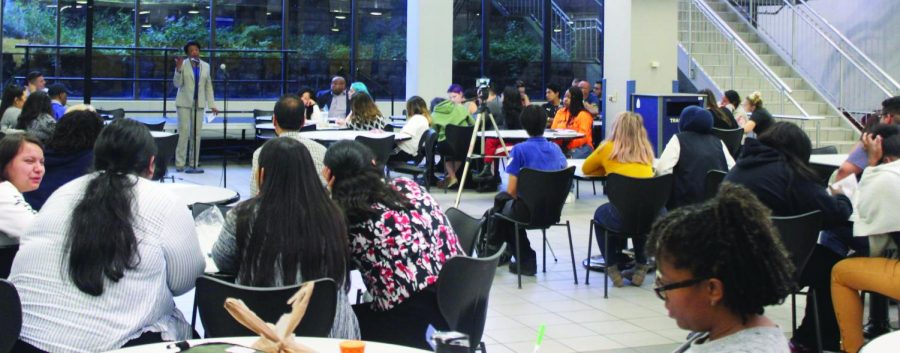Students reaction to president’s town hall
Too little and late, but better than nothing?
October 8, 2019
Some students indicated that they believed the Student Town Hall with President Gloria Gibson on Sept. 24 came too late to effectively address the anguish and anxiety caused by the Daniel L. Goodwin Distinguished Lecture Series on Sept. 12. NEIU Student Government Association (SGA) President Melanie Glover introduced the town hall, describing the gathering as a “dialogue and discussion.” Ombuds Tyler Smith moderated.
Gibson stressed that we are all “lifelong learners,” learning from one another, she learning from us the students as well. Gibson promised increased communication with students, as she stated that many students do not know her. “Serving students is my passion,” she said.
Carolina Schwartz, a Master of Social Work student, asked Gibson “what it would have taken” for her to cancel the lecture. Schwartz described the letter signed by hundreds of students, faculty and staff, describing the pain the lecture would cause them and why Gibson still felt it was a good idea to proceed with the lecture.
“I think it’s important to validate everybody’s feelings. In my opinion, it was kind of a slap in the face that so many staff and students told you that this was going to hurt them. And you know what? It seemed as if you were saying, ‘You are not important,’” said Schwartz.
Gibson replied, “I supported students. I supported your protest. I met with our Student Trustee, Fatima [Siddiqua]. I met with Melanie. And I said students have a right to protest. And I supported that right to protest….The lecture – the main idea was for a dialogue but also for questions from students, faculty and staff. There was an opportunity there for anyone to ask a question and some of those questions, including the petition that was submitted by the faculty, to ask those questions.”
SGA Senator Natalia Borowska, junior and a double major in justice studies and political science, said of the town hall, “I’m glad it eventually happened overall. I think many students wished this could have come way sooner. If she came to the first lecture hall, where students were expressing their concerns, then I think students like myself [would be] satisfied with that …But the fact that she said she couldn’t. Her schedule was already full. Students should be a priority like she says it is…. I just wish the president would have taken it seriously in the sense that she would speak to students one on one….Sean Spicer came two weeks ago. Students are just mad now. Now there’s nothing the president can do to make it better at this point. It’s [a later town hall is] better than nothing.”
Liliana Armas Serna, a Council of Clubs Representative and communication, media and theatre student said, “I think it was really nice that the president set aside time to address the students and talk to students, and more importantly, apologize to the students. I do feel that this whole Sean Spicer fiasco could have been avoided. But I think that it was very good of her to set it up and have students go up and ask her questions because that shows that she’s open. I just hope in the future that she will listen to students’ voices more. So that’s all that one can really hope for.”
Student Ezekiel Davis, a history/education major, asked Dr. Gibson, “What was your purpose of bringing Sean Spicer to one of the most diverse institutions in Chicago or your intentions of having him at this institution?”
Gibson replied, “For me, we are facing a critical time. We have a presidential election next year. It seems to me that we as a campus and certainly as young people need to be informed about what the issues are that are facing us as we move forward to the 2020 election. So as I said earlier, we wanted different ideas to discuss and debate issues. And so we had a Democrat and we had a Republican….The decision to have a Democrat and a Republican was my decision. I have to live with that. And I own that. In leadership, you have to own your decisions. And that was my decision. Could it have been done differently? Yes. Will it be done differently in the future? Yes. But this was a decision that I made at that time.”
Davis said, “I believe that there must be some healing involved because understanding the history of this particular politician, not top secret, dealing with immigrants of Mexico and other countries, [there] must be healing. Certain things must not happen again. Certain rules have to change.”








